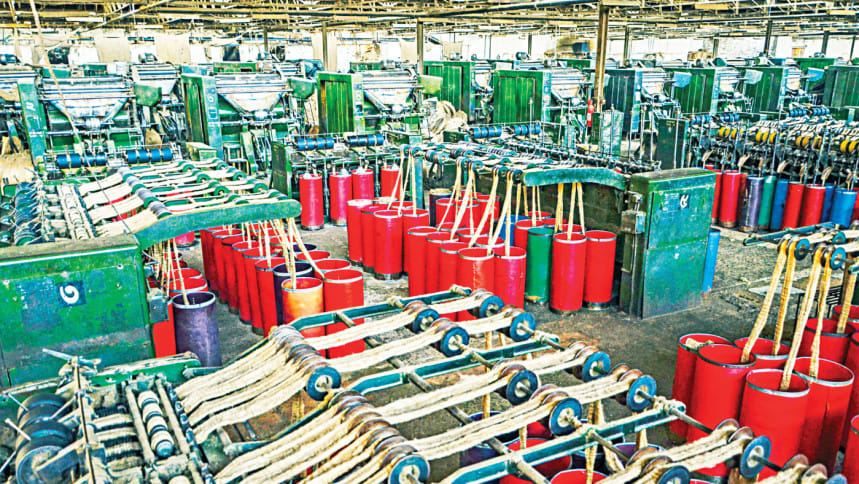Production starts at two jute mills leased to private sector

Two state-owned jute mills that were leased to the private sector recently began production, creating many employment opportunities in the process, according to Golam Dastagir Gazi, the minister of textiles and jute.
Gazi made this comment while inspecting production at Bangladesh Jute Mills Ltd, one of the leased units, in Palash upazila of Narsingdi yesterday.
The other mill is Karnafuli Jute Mills Ltd in Chattogram.
Bangladesh Jute Mills, which was leased by Bay Group, is producing jute yarn and sacks while Unitex Group is using Karnafuli Jute Mills to produce various jute products for local and international markets.
Both mills were leased for 20 years through an open bidding system.
Meanwhile, the leasing of two other jute mills -- Crescent Jute Mills Ltd in Khulna and Hafiz Jute Mills Ltd in Chattogram -- is under process.
In addition, 53 proposals have already been received from 18 national and international organisations for 13 other mills, the minister said.
The proposal evaluation committee has already submitted its evaluation report in this regard to the Bangladesh Jute Mills Corporation (BJMC).
Besides, the BJMC has sent a letter to the ministry seeking permission to issue a request for financial proposals from the evaluated institutions, he added.
Gazi hopes that if it is possible to lease the rest of the mills, it would create many employment opportunities where terminated workers would be given priority.
Earlier on February 1 this year, the government handed over the two jute mills to the private sector as a part of its efforts to modernise the state-run enterprises dealing with the natural fibre.
According to the BJMC, Jute Alliance Ltd, a concern of Bay Group, paid Tk 9.60 crore in advance rent while Unitex Group paid Tk 5.28 crore for 24 months. The bills and other expenditures would be borne by the investors as well.
The BJMC has been acting as a monitoring body to oversee whether investors comply with the terms and conditions. The investors can upgrade the machinery after taking consent from the corporation, according to the BJMC.
The two mills were handed over about 18 months after the BJMC shuttered 25 state-owned jute mills across the country.
The government decided to shut the mills in January 2020 to put an end to the heavy losses they incurred and to modernise the mills.
Later, a 13-member technical committee was formed to suggest ways to reopen the mills. Finally, the government decided to lease out the mills for a period of five to 20 years.
At the time, more than 50,000 workers in three categories -- permanent, temporary, and substitute -- were laid off. Of them, 25,000 employees and workers were provided 100 per cent of their dues so far.
According to the textile and jute ministry, Tk 3,563 crore has been paid to all the permanent workers of 25 jute mills as gratuity, provident fund, encashment of leaves through the Golden Handshake facility.
In addition, the textile and jute ministry and finance ministry are working hard to pay the arrears of verified substitute workers; arrears of workers for case settlement or withdrawal; arrears of 64 weeks during operation at the mills; gratuity of retired officers and employees; and arrears of raw jute traders, the ministry said in a press release yesterday.

 For all latest news, follow The Daily Star's Google News channel.
For all latest news, follow The Daily Star's Google News channel. 



Comments